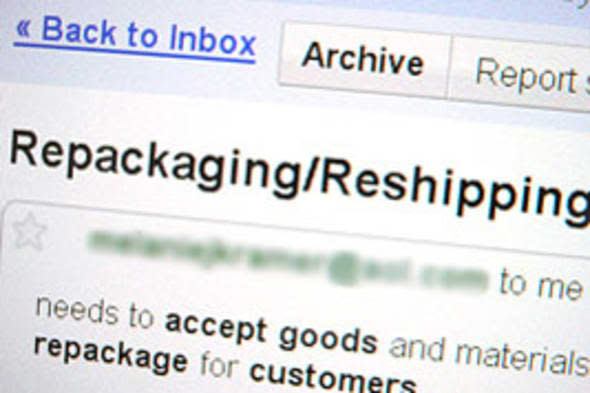How to spot a job scam

Last year, the government's Universal Jobmatch website was ridiculed for posting joke job ads for Mafia hitmen, drugs couriers and even MI5 snipers.
More recently, though, the fake job ads have become rather less funny. Earlier this year, Labour MP Frank Field claimed that as many as half the jobs on the website may be bogus, falsely promoted or against the rules, and described the site as "bedevilled with fraud" .
And this isn't the only place that fake job ads are popping up. Last month, Liverpool jobseeker Paul McDermott was scammed after spotting an advert for warehouse operatives earning £600 per week on the website www.jobisjob.co.uk. He was told his application was successful - and asked to send a £50 UKash voucher to pay for a Criminal Records Bureau (CRB) check.
But when he didn't hear back from the agency, he discovered the job didn't exist.
Job seekers who have posted their CVs online are also often targeted directly, says Action Fraud. You're approached by someone claiming to be an employer or agent and asked to fill in a questionnaire. You may also be interviewed over the phone. You're told you're successful - but, like McDermott, you're expected to pay some sort of fee.
One recent fraud offered jobs in the offshore oil and gas industry through an authentic-looking website, First Oil Energy. But when one graduate applied, he was told that he'd got the job, on condition that he took an online training course through an organisation called Oil Education. He paid a three-figure sum for this course - and Oli Education pursued him for £1,000 more.
The whole thing, of course, was a scam.
"We are concerned that people looking to improve their career opportunities are being targeted by such websites," says Carole Jackson, environmental health and trading standards manager for Aberdeen City Council.
"There are genuine online learning course providers, and a list of those applicable to the oil and gas industry can be checked on the website of OPITO, the industry's focal point for skills, training and workforce development."
If the job's abroad, the scammers can often keep the fees mounting up for as long as the victim is prepared to keep paying them. "When you pay one fee (eg a visa administration fee), the agency will tell you about another fee that has to be paid (eg a deposit on accommodation). In reality, the fraudulent agency makes none of these arrangements," says Action Fraud.
"What's more, the fraudsters may also ask for your bank account details to set up salary payments. They will use these details to steal money from your account."
Another scam involves advertising jobs with titles such as "money transfer agent" or "payment processing agent", receiving and then paying out funds. The reason given is usually that, as a foreign company, the employer can't do it themselves. But in reality, the job is simply money-laundering - and what you're doing is illegal. And to make things worse, the scammers may con you out of your money too.
How to spot a scam
One of the first things to look for is poor spelling and grammar, particularly when the ad purports to come from a large organisation.
Be very cautious if the ad says there's no experience necessary, or if the salary seems too high. Scammers also tend to be very vague about what the job actually entails.
One sign of a scam is if the organisation contacts you, rather than the other way round - especially if they then talk in very general terms, without reference to your particular skills.
Be suspicious if you're offered the job after only a telephone or instant-messaging interview - especially if you're offered the job on the spot. Real employers simply don't do this. And because scammers are often based overseas, they can appear to work decidedly odd hours; if you're getting 2:00 am emails, beware.
Check out the company yourself - don't rely on the information in the advertisement. If the company is one you know to exist, compare the phone number with the one you've been given. Be wary of free-to-set-up non-company email addresses such as john.smith@hotmail.com. Look for john.smith@bigcorp.com instead. If you're at all uncertain, contact the company directly and check with the HR department that the job really does exist.
Alarm bells should ring if you are asked to pay upfront fees, especially via e-money. And don't provide identification documents and bank account details unless you are absolutely certain that the job is genuine.
Where the job being offered is overseas, a useful tip is to check out the cost of a visa with the embassy. If the amount doesn't match up with what you've been told, there's a very strong chance it's a scam.
And if the employer is offering services such as travel or accommodation, tell them you'll make arrangements yourself. If they insist that you use a particular agency, beware.
Finally, trust your gut instinct. If something feels not quite right, then it probably isn't.
Read more about scams on AOL Money:
Scamwatch: latest phone fraud
Tax man warning over scam emails
Summer scamwatch: street crime




